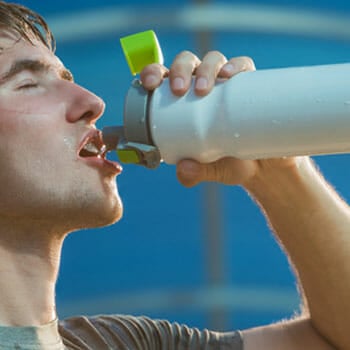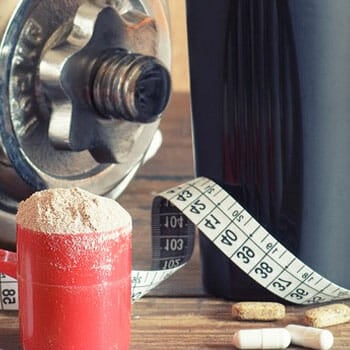Creatine is one of the most studied supplements for muscle growth, especially during bulking phases.
Yet, debate continues over creatine HCL vs. monohydrate.
To find out which is better for your fitness goals, together with my colleagues at Total Shape, we consulted a nutritionist to compare them scientifically.
Quick Summary
- While creatine HCL offers faster absorption, creatine monohydrate's long history of proven effectiveness makes it a strong contender for the better type.
- Combining creatine with beta-alanine can enhance performance and reduce early muscle fatigue, offering a synergistic effect for athletes.
- Creatine monohydrate has been shown to be about 99.8% pure, ensuring almost full dosage efficiency when consumed.
- Given my experience, I recommend starting with creatine monohydrate due to its long-standing track record and comprehensive benefits.
Difference Between Creatine HCL And Creatine Monohydrate?
1. Absorption

One key difference between creatine HCL and monohydrate is absorption speed.
HCL is more water-soluble, requiring less planning around timing or food.
Research in Food and Nutrition shows it reaches muscle cells faster than monohydrate.
2. Effectiveness
The International Society of Sports Nutrition has done some research and found that over a longer period, creatine monohydrate offers more benefits important for athletic performance compared to creatine hydrochloride [2].
“Creatine is thought to improve strength, increase lean muscle mass, and help the muscles recover more quickly during exercise. This muscular boost might help athletes achieve bursts of speed and energy, especially during short bouts of high-intensity activities such as weight lifting or sprinting.”
- WebMD.com
Drawing from my years in competitive sports, I've personally used both creatine HCL and monohydrate.
While creatine HCL is newer, I've found it effective in my training regimens, complementing the proven track record of creatine monohydrate. So, based on my experience, both forms have their merits.
3. Purity

Creatine monohydrate stands out for its purity—about 99.8%, so a 5g dose delivers nearly the full amount.
HCL is less pure due to added compounds for better absorption, but that isn’t necessarily a drawback.
4. Convenience
Creatine HCL is 40 times more soluble than monohydrate, dissolving almost instantly in water.
Some users report feeling its effects within 15 minutes, often taking it post-warm-up.
5. Dietary Considerations and Interactions
Those on a ketogenic diet might find creatine monohydrate more beneficial due to its role in facilitating quick energy release, which complements the rapid energy needs of a low-carb lifestyle.
Conversely, vegan or vegetarian diets, typically lower in natural creatine sources like red meat, may see enhanced benefits from either form of creatine supplementation.
6. Side Effects

One advantage of creatine HCL is fewer side effects, thanks to faster absorption, according to the Journal of the International Society of Sports Nutrition.
It’s less likely to cause bloating, stomach upset, or water retention—common issues with monohydrate, which is why I recommend starting with smaller doses.
If you notice signs of swelling and water retention, then it might be better to switch from creatine monohydrate to HCL.
7. Price
From my time managing both personal and client supplement budgets, I've observed that creatine HCL can be more costly for extended loading phases compared to monohydrate.
This is an important consideration for athletes who, like me, need to balance cost with performance.
The faster absorption and fewer adverse effects do come at a price. If cost is going to be an issue, then I suggest trying out creatine monohydrate, even if it’s slower-acting.
You could plan to take creatine monohydrate about 30 minutes before your workout and still get good results for increased muscle mass.

FAQs
Will Creatine HCL Make You Bigger?
Yes, creatine HCL can make you bigger with weight gain when combined with a high-intensity workout, as with creatine monohydrate. It might increase the amount of water in your muscle cells and develop more muscle fibers from resistance training.
Is Creatine HCL Bad for Your Teeth?
No, creatine HCL isn’t bad for your teeth unless you eat the powder without diluting it. The hydrochloric acid in the creatine supplement could impact your teeth, but in capsule and mixed form, it shouldn’t have any effects.
Should You Take Creatine Every Day?
You could take creatine every day, but it’s only beneficial when you do higher-intensity training.
How Long Does It Take for Creatine HCL to Work?
It takes about a week for creatine HCL to take effect. You would have to take the supplement consistently and work out for at least four days to see the impact of higher endurance, better physical performance, and muscle growth.
Creatine Monohydrate vs. HCL
When choosing between creatine HCL and monohydrate, it ultimately depends on your specific fitness goals and personal preferences.
Total Shape recommends starting with creatine monohydrate due to its proven effectiveness over the years.
However, if faster absorption and fewer side effects are crucial for you, then creatine HCL could be the better option.
References:
- https://www.researchgate.net/publication/288670717
- https://www.researchgate.net/publication/317612254
- https://www.ncbi.nlm.nih.gov/pmc/articles/PMC3407788
About The Author
You May Also Like






